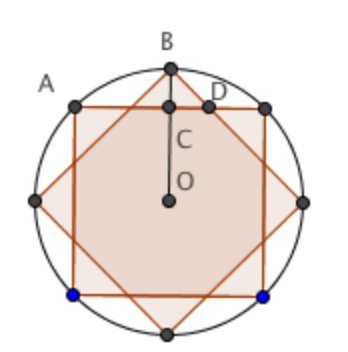Difference between revisions of "2013 AMC 10A Problems/Problem 20"
Claudeaops (talk | contribs) m (Fixing Latex) |
Claudeaops (talk | contribs) (Fixing Latex) |
||
| Line 30: | Line 30: | ||
[[Image:AMC 10A 2013 20.jpg]] | [[Image:AMC 10A 2013 20.jpg]] | ||
| − | Let <math>O</math> be the center of the square and <math>C</math> be the intersection of <math>OB</math> and <math>AD</math>. The desired area consists of the unit square, plus 4 regions congruent to the region bounded by arc <math>AB</math>, <math>\overline{AC}</math>, and <math>\overline{BC}</math>, plus 4 triangular regions congruent to right triangle <math>BCD</math>. The area of the region bounded by arc <math>AB</math>, <math>\overline{AC}</math>, and <math>\overline{BC}</math> is (Area of Circle-Area of Square)/8. Since the circle has radius <math>\dfrac{1}{\sqrt {2}}</math>, the area of the region is <math>\dfrac{\dfrac{\pi}{2}-1}{8}</math>, so 4 times the area of that region is <math>\dfrac{\pi}{4}-\dfrac{1}{2}</math>. Now we find the area of <math>\triangle BCD</math>. <math>BC=BO-OC=\dfrac{\sqrt {2}}{2}-\dfrac{1}{2}</math>. Since <math>\triangle BCD</math> is a 45-45-90 right triangle, the area of <math>\triangle BCD</math> is <math>\dfrac{BC^2}{2}=\dfrac{( | + | Let <math>O</math> be the center of the square and <math>C</math> be the intersection of <math>OB</math> and <math>AD</math>. The desired area consists of the unit square, plus 4 regions congruent to the region bounded by arc <math>AB</math>, <math>\overline{AC}</math>, and <math>\overline{BC}</math>, plus 4 triangular regions congruent to right triangle <math>BCD</math>. The area of the region bounded by arc <math>AB</math>, <math>\overline{AC}</math>, and <math>\overline{BC}</math> is (Area of Circle-Area of Square)/8. Since the circle has radius <math>\dfrac{1}{\sqrt {2}}</math>, the area of the region is <math>\dfrac{\dfrac{\pi}{2}-1}{8}</math>, so 4 times the area of that region is <math>\dfrac{\pi}{4}-\dfrac{1}{2}</math>. Now we find the area of <math>\triangle BCD</math>. <math>BC=BO-OC=\dfrac{\sqrt {2}}{2}-\dfrac{1}{2}</math>. Since <math>\triangle BCD</math> is a 45-45-90 right triangle, the area of <math>\triangle BCD</math> is <math>\dfrac{BC^2}{2}=\dfrac {\left (\dfrac {\sqrt {2}}{2}-\dfrac{1}{2} \right)^2}{2}</math>, so 4 times the area of <math>\triangle BCD</math> is <math>\dfrac{3}{2}-\sqrt {2}</math>. Finally, the area of the whole region is <math>1+ \left(\dfrac {3}{2}-\sqrt {2} \right) + \left(\dfrac{\pi}{4}-\dfrac{1}{2} \right)=\dfrac{\pi}{4}+2-\sqrt {2}</math>. |
==See Also== | ==See Also== | ||
Revision as of 18:17, 18 August 2014
Contents
Problem
A unit square is rotated ![]() about its center. What is the area of the region swept out by the interior of the square?
about its center. What is the area of the region swept out by the interior of the square?
![]()
Solution 1
First, we need to see what this looks like. Below is a diagram.
![[asy] size(200); defaultpen(linewidth(0.8)); path square=shift((-.5,-.5))*unitsquare,square2=rotate(45)*square; fill(square^^square2,grey); for(int i=0;i<=3;i=i+1) { path arcrot=arc(origin,sqrt(2)/2,45+90*i,90*(i+1)); draw(arcrot); fill(arcrot--((sqrt(2)-1)/(2*sqrt(2)),0)--cycle,grey); draw(arc(origin,sqrt(2)/2+1/8,50+90*i,90*(i+1)-10),EndArrow); } draw(square^^square2);[/asy]](http://latex.artofproblemsolving.com/0/c/a/0caec9712738ab044db79a8329cb13fd0006a610.png)
For this square with side length 1, the distance from center to vertex is ![]() , hence the area is composed of a semicircle of radius
, hence the area is composed of a semicircle of radius ![]() , plus
, plus ![]() times a parallelogram with height
times a parallelogram with height ![]() and base
and base ![]() . That is to say, the total area is
. That is to say, the total area is ![]() .
.
Solution 2
Let ![]() be the center of the square and
be the center of the square and ![]() be the intersection of
be the intersection of ![]() and
and ![]() . The desired area consists of the unit square, plus 4 regions congruent to the region bounded by arc
. The desired area consists of the unit square, plus 4 regions congruent to the region bounded by arc ![]() ,
, ![]() , and
, and ![]() , plus 4 triangular regions congruent to right triangle
, plus 4 triangular regions congruent to right triangle ![]() . The area of the region bounded by arc
. The area of the region bounded by arc ![]() ,
, ![]() , and
, and ![]() is (Area of Circle-Area of Square)/8. Since the circle has radius
is (Area of Circle-Area of Square)/8. Since the circle has radius ![]() , the area of the region is
, the area of the region is ![]() , so 4 times the area of that region is
, so 4 times the area of that region is ![]() . Now we find the area of
. Now we find the area of ![]() .
. ![]() . Since
. Since ![]() is a 45-45-90 right triangle, the area of
is a 45-45-90 right triangle, the area of ![]() is
is  , so 4 times the area of
, so 4 times the area of ![]() is
is ![]() . Finally, the area of the whole region is
. Finally, the area of the whole region is ![]() .
.
See Also
| 2013 AMC 10A (Problems • Answer Key • Resources) | ||
| Preceded by Problem 19 |
Followed by Problem 21 | |
| 1 • 2 • 3 • 4 • 5 • 6 • 7 • 8 • 9 • 10 • 11 • 12 • 13 • 14 • 15 • 16 • 17 • 18 • 19 • 20 • 21 • 22 • 23 • 24 • 25 | ||
| All AMC 10 Problems and Solutions | ||
The problems on this page are copyrighted by the Mathematical Association of America's American Mathematics Competitions. 










